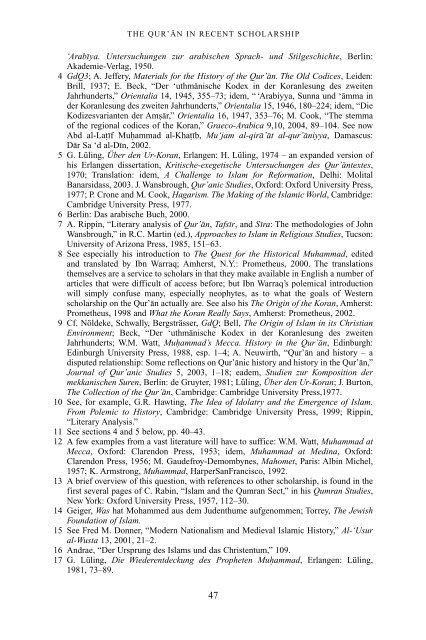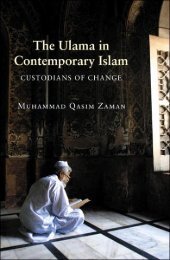The Qur'an in its historical context (pdf - Islam and Christian-Muslim ...
The Qur'an in its historical context (pdf - Islam and Christian-Muslim ...
The Qur'an in its historical context (pdf - Islam and Christian-Muslim ...
Create successful ePaper yourself
Turn your PDF publications into a flip-book with our unique Google optimized e-Paper software.
THE QUR’AN IN RECENT SCHOLARSHIP<br />
‘Arabiya. Untersuchungen zur arabischen Sprach- und Stilgeschichte, Berl<strong>in</strong>:<br />
Akademie-Verlag, 1950.<br />
4 GdQ3; A. Jeffery, Materials for the History of the Qur’an. <strong>The</strong> Old Codices, Leiden:<br />
Brill, 1937; E. Beck, “Der ‘uthmanische Kodex <strong>in</strong> der Koranlesung des zweiten<br />
Jahrhunderts,” Orientalia 14, 1945, 355–73; idem, “ ‘Arabiyya, Sunna und ‘amma <strong>in</strong><br />
der Koranlesung des zweiten Jahrhunderts,” Orientalia 15, 1946, 180–224; idem, “Die<br />
Kodizesvarianten der Amsar,” Orientalia 16, 1947, 353–76; M. Cook, “<strong>The</strong> stemma<br />
of the regional codices of the Koran,” Graeco-Arabica 9,10, 2004, 89–104. See now<br />
Abd al-Latif Muhammad al-Khatib, Mu‘jam al-qira’at al-qur’aniyya, Damascus:<br />
Dar Sa ‘d al-D<strong>in</strong>, 2002.<br />
5 G. Lül<strong>in</strong>g, Über den Ur-Koran, Erlangen: H. Lül<strong>in</strong>g, 1974 – an exp<strong>and</strong>ed version of<br />
his Erlangen dissertation, Kritische-exegetische Untersuchungen des Qur’antextes,<br />
1970; Translation: idem, A Challenge to <strong>Islam</strong> for Reformation, Delhi: Molital<br />
Banarsidass, 2003. J. Wansbrough, Qur’anic Studies, Oxford: Oxford University Press,<br />
1977; P. Crone <strong>and</strong> M. Cook, Hagarism. <strong>The</strong> Mak<strong>in</strong>g of the <strong>Islam</strong>ic World, Cambridge:<br />
Cambridge University Press, 1977.<br />
6 Berl<strong>in</strong>: Das arabische Buch, 2000.<br />
7 A. Ripp<strong>in</strong>, “Literary analysis of Qur’an, Tafsir, <strong>and</strong> Sira: <strong>The</strong> methodologies of John<br />
Wansbrough,” <strong>in</strong> R.C. Mart<strong>in</strong> (ed.), Approaches to <strong>Islam</strong> <strong>in</strong> Religious Studies, Tucson:<br />
University of Arizona Press, 1985, 151–63.<br />
8 See especially his <strong>in</strong>troduction to <strong>The</strong> Quest for the Historical Muhammad, edited<br />
<strong>and</strong> translated by Ibn Warraq; Amherst, N.Y.: Prometheus, 2000. <strong>The</strong> translations<br />
themselves are a service to scholars <strong>in</strong> that they make available <strong>in</strong> English a number of<br />
articles that were difficult of access before; but Ibn Warraq’s polemical <strong>in</strong>troduction<br />
will simply confuse many, especially neophytes, as to what the goals of Western<br />
scholarship on the Qur’an actually are. See also his <strong>The</strong> Orig<strong>in</strong> of the Koran, Amherst:<br />
Prometheus, 1998 <strong>and</strong> What the Koran Really Says, Amherst: Prometheus, 2002.<br />
9 Cf. Nöldeke, Schwally, Bergsträsser, GdQ; Bell, <strong>The</strong> Orig<strong>in</strong> of <strong>Islam</strong> <strong>in</strong> <strong>its</strong> <strong>Christian</strong><br />
Environment; Beck, “Der ‘uthmanische Kodex <strong>in</strong> der Koranlesung des zweiten<br />
Jahrhunderts; W.M. Watt, Muhammad’s Mecca. History <strong>in</strong> the Qur’an, Ed<strong>in</strong>burgh:<br />
Ed<strong>in</strong>burgh University Press, 1988, esp. 1–4; A. Neuwirth, “Qur’an <strong>and</strong> history – a<br />
disputed relationship: Some reflections on Qur’anic history <strong>and</strong> history <strong>in</strong> the Qur’an,”<br />
Journal of Qur’anic Studies 5, 2003, 1–18; eadem, Studien zur Komposition der<br />
mekkanischen Suren, Berl<strong>in</strong>: de Gruyter, 1981; Lül<strong>in</strong>g, Über den Ur-Koran; J. Burton,<br />
<strong>The</strong> Collection of the Qur’an, Cambridge: Cambridge University Press,1977.<br />
10 See, for example, G.R. Hawt<strong>in</strong>g, <strong>The</strong> Idea of Idolatry <strong>and</strong> the Emergence of <strong>Islam</strong>.<br />
From Polemic to History, Cambridge: Cambridge University Press, 1999; Ripp<strong>in</strong>,<br />
“Literary Analysis.”<br />
11 See sections 4 <strong>and</strong> 5 below, pp. 40–43.<br />
12 A few examples from a vast literature will have to suffice: W.M. Watt, Muhammad at<br />
Mecca, Oxford: Clarendon Press, 1953; idem, Muhammad at Med<strong>in</strong>a, Oxford:<br />
Clarendon Press, 1956; M. Gaudefroy-Demombynes, Mahomet, Paris: Alb<strong>in</strong> Michel,<br />
1957; K. Armstrong, Muhammad, HarperSanFrancisco, 1992.<br />
13 A brief overview of this question, with references to other scholarship, is found <strong>in</strong> the<br />
first several pages of C. Rab<strong>in</strong>, “<strong>Islam</strong> <strong>and</strong> the Qumran Sect,” <strong>in</strong> his Qumran Studies,<br />
New York: Oxford University Press, 1957, 112–30.<br />
14 Geiger, Was hat Mohammed aus dem Judenthume aufgenommen; Torrey, <strong>The</strong> Jewish<br />
Foundation of <strong>Islam</strong>.<br />
15 See Fred M. Donner, “Modern Nationalism <strong>and</strong> Medieval <strong>Islam</strong>ic History,” Al-‘Usur<br />
al-Wusta 13, 2001, 21–2.<br />
16 Andrae, “Der Ursprung des <strong>Islam</strong>s und das Christentum,” 109.<br />
17 G. Lül<strong>in</strong>g, Die Wiederentdeckung des Propheten Muhammad, Erlangen: Lül<strong>in</strong>g,<br />
1981, 73–89.<br />
47



